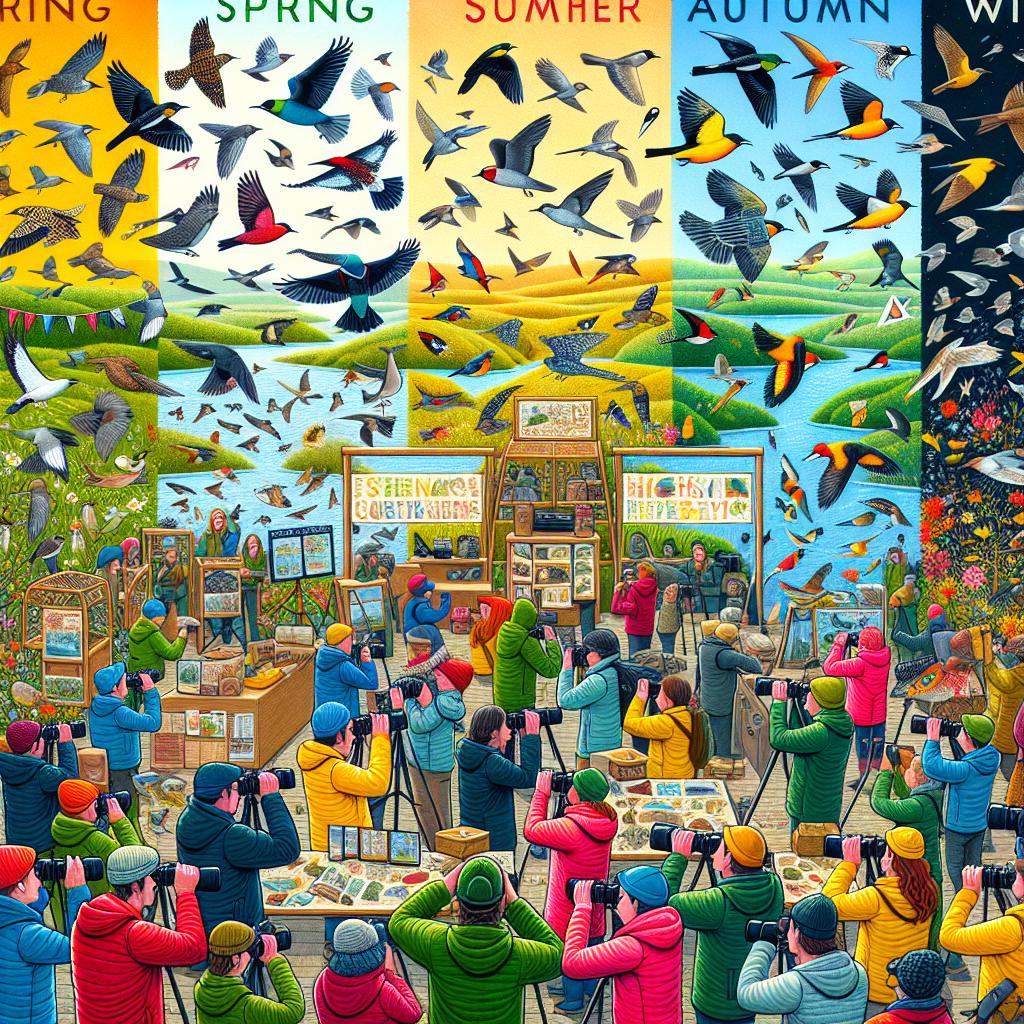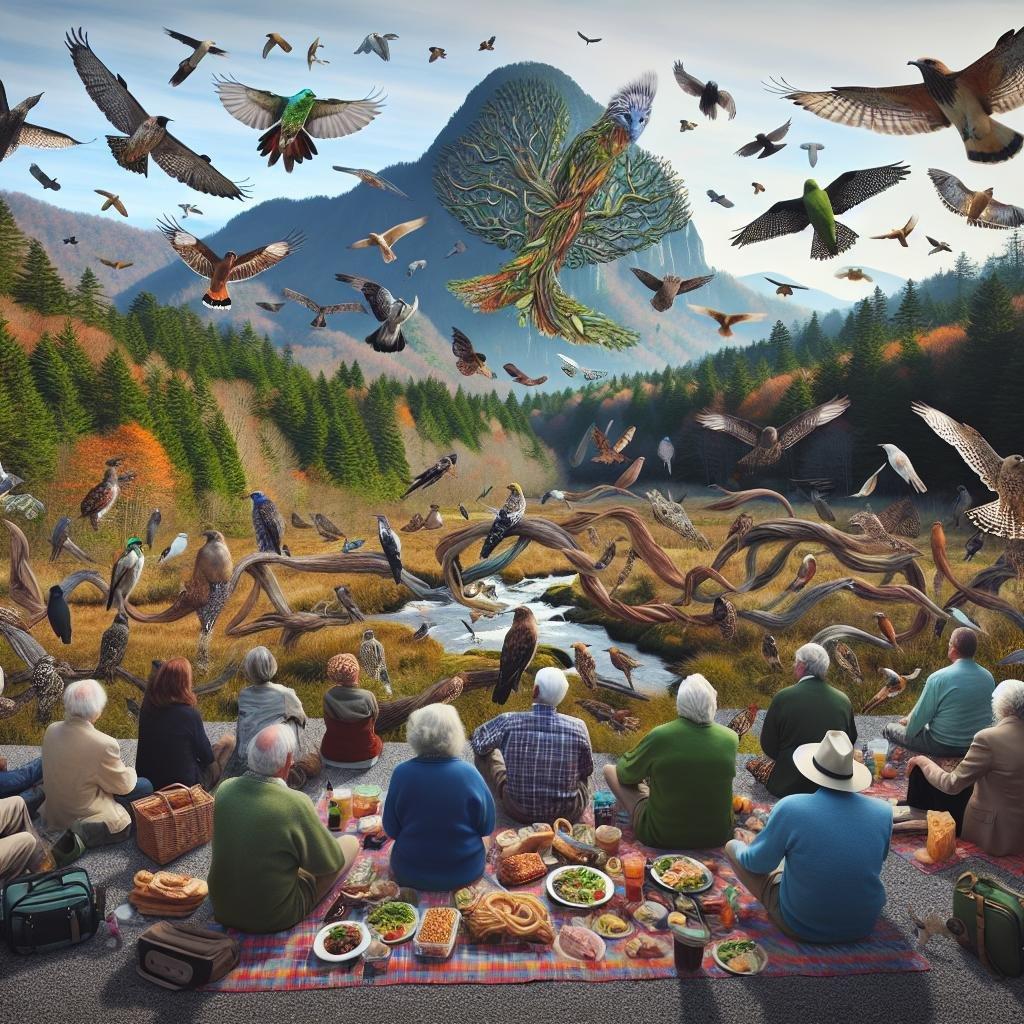In the verdant embrace of the Smoky Mountains, where mist-clad peaks kiss the sky and ancient forests weave tales of time, nature’s symphony plays to the tune of chirping delights. For bird enthusiasts and casual picnickers alike, this enchanting region beckons with the promise of a unique and immersive experience. Picture yourself spreading a blanket amidst wildflower meadows, the air filled with the melodic chatter of feathered friends, while the majesty of these grand highlands provides a stunning backdrop. Whether you’re an avid birder eager for the thrill of a rare sighting or a family seeking a serene day out, we invite you to explore the top picnic spots perfect for bird watching and delve into the vibrant birding festivals that celebrate the avian wonders of the Smokies. Here, every chirp and flutter tells a story, and every moment spent is a brush with nature’s artistry.
Scenic Picnic Locations with Avian Delights
Imagine spreading your picnic blanket on the lush, green meadows of Cades Cove, a location renowned not just for its natural beauty but also for its diverse avian population. Nestled in the heart of the valley, this picturesque spot offers expansive vistas perfect for bird watchers. Keep your binoculars ready to catch glimpses of native species such as the Indigo Bunting and the Eastern Bluebird. As you bite into your sandwich, listen to the melodious call of the Red-eyed Vireo perched nearby. If a more structured birding experience excites you, tie your visit with the annual birding festivals held in the area, which include guided tours and expert talks.
For those who crave a mix of serene picnicking and vibrant avian life, the Little River Trail offers a magical setting. Located along the riverbanks and shaded by tall, ancient trees, this trail is a haven for birds like the Black-capped Chickadee and the Northern Cardinal. Imagine sharing your picnic with fluttering companions while the sound of rushing water soothes your senses. The Smoky Mountains Wildlife Festival, often hosted here, features interactive workshops and bird-counting activities, making it a compelling spot for both novice and seasoned bird watchers.
| Location | Bird Species |
|---|---|
| Cades Cove | Indigo Bunting, Eastern Bluebird |
| Little River Trail | Black-capped Chickadee, Northern Cardinal |

Must-Visit Bird Watching Hotspots
The Smoky Mountains boast an array of spectacular bird-watching hotspots that appeal to both novice and seasoned birders. Cades Cove, with its lush meadows and scenic vistas, provides the perfect backdrop for spotting Indigo Buntings and American Goldfinches. Clingmans Dome offers high-altitude birding, where you might catch a glimpse of the elusive Red Crossbill or the charismatic Black-capped Chickadee. The tranquil beauty of Roaring Fork makes it ideal for photographing Pileated Woodpeckers as they carve their marks into tree bark.
For those planning a birding adventure, timing your visit with one of the region’s birding festivals can offer an enriched experience. The Spring Wildflower Pilgrimage combines flora and avifauna tours in the heart of the Smokies, while The Great Smoky Mountains Birding Festival features expert-led excursions and engaging workshops. Check out the table below for a quick overview of must-visit spots and birding festivals:
| Hotspot | Location | Noteworthy Bird |
|---|---|---|
| Cades Cove | Great Smoky Mountains National Park | Indigo Bunting |
| Clingmans Dome | Highest Point in Tennessee | Red Crossbill |
| Roaring Fork | Gatlinburg, TN | Pileated Woodpecker |

Seasonal Birding Festivals You Cant Miss
The year-round beauty of the Smoky Mountains sets the perfect backdrop for some outstanding birding festivals you simply can’t miss. Every season brings new feathered friends, and the local birding festivals offer enthusiasts a chance to marvel at the avian diversity. Whether you’re an avid birder or just looking for a unique way to enjoy nature, these events promise a delightful experience. The winter brings the Winter Wings Festival, where you can spot rare species like the Northern Goshawk. Meanwhile, spring blooms with the Spring Wildlife Festival, celebrating migration patterns as vibrant warblers and thrushes return to the mountains. Summer heats up with the Smoky Mountains Birding Festival, a fantastic opportunity to see native species in their natural habitats while enjoying expert-led workshops and birding walks.
For those planning a visit, here are some must-attend festivals highlighted for their unique offerings:
- Winter Wings Festival: Held every January, focusing on rare winter species and featuring guided tours.
- Spring Wildlife Festival: Occurs from late March to early April, centered around migratory birds and their dazzling colors.
- Smoky Mountains Birding Festival: Takes place in June, offering expert-led birdwatching expeditions and photography workshops.
| Festival | Season | Highlight |
|---|---|---|
| Winter Wings Festival | Winter | Northern Goshawk |
| Spring Wildlife Festival | Spring | Migratory Warblers |
| Smoky Mountains Birding Festival | Summer | Native Bird Habitats |

Insider Tips for a Perfect Bird Watching Experience
Whether you’re a seasoned ornithologist or a curious rookie, planning your bird-watching adventures in the Smoky Mountains can be immensely rewarding. To start, choosing the right picnic spots enhances your overall experience. Cades Cove offers an idyllic setting, featuring open meadows frequented by bird species like the Northern Parula and the Ruby-throated Hummingbird. Another gem is Clingmans Dome, the highest point in the park where you might spot Peregrine Falcons soaring through the skies. For a more secluded experience, consider Greenbrier, known for its diverse bird population and less crowded trails.
| Location | Key Bird Species |
|---|---|
| Cades Cove | Northern Parula, Ruby-throated Hummingbird |
| Clingmans Dome | Peregrine Falcon |
| Greenbrier | Diverse Bird Population |
Additionally, aligning your visit with one of the area’s birding festivals can provide unique opportunities to learn from experts and meet fellow enthusiasts. The Great Smoky Mountains Birding Expedition is a must-attend event in the spring, offering guided walks and lectures by leading ornithologists. In the fall, don’t miss the Highlands Nature Festival, which focuses on migratory patterns and habitat conservation. Both festivals provide not only educational insight but also activities for all ages, making it a balanced mix of fun and learning for families and solo adventurers alike.
Q&A
Q&A: Top Picnic Spots for Bird Watching and Birding Festivals in the Smoky Mountains
Q: Why are the Smoky Mountains a prime destination for bird watchers?
A: The Smoky Mountains attract bird watchers due to their diverse ecosystems, which host a variety of bird species. From lush forests to open meadows, the region offers a habitat for over 240 species of birds, making it a haven for avian enthusiasts.
Q: What are some of the best picnic spots for bird watching in the Smoky Mountains?
A: Some top picnic spots include:
- Cades Cove: A serene valley that offers open landscapes, perfect for spotting various species such as the Red-tailed Hawk and the Indigo Bunting.
- Clingmans Dome: The highest point in the Smokies, providing panoramic views and opportunities to observe high-altitude birds like the Northern Saw-whet Owl.
- Chimneys Picnic Area: Nestled by a bubbling stream, this spot is popular for its proximity to forest-dwelling birds, including the Black-throated Green Warbler.
Q: What birding festivals take place in the Smoky Mountains?
A: The Smoky Mountains hosts several engaging birding festivals, including:
- Spring Wildflower Pilgrimage: Held in late April, this event combines wildflower spotting with bird watching, featuring guided tours and expert-led bird identification walks.
- Autumn Birding Festival: Celebrated in October, this festival focuses on the fall migration, offering workshops and birding tours to observe species on the move.
Q: Can beginners participate in these birding festivals?
A: Absolutely! Both the Spring Wildflower Pilgrimage and the Autumn Birding Festival cater to birders of all levels. They provide beginner-friendly programs, expert talks, and guided walks that help newcomers learn the basics of bird watching and identification.
Q: Are there any specific species that bird watchers seek in the Smoky Mountains?
A: Yes, several species are particularly sought after, such as:
- Cerulean Warbler: Known for its striking blue plumage, often found in mature deciduous forests.
- Peregrine Falcon: A thrilling sight as it soars above the mountainous terrain.
- Eastern Screech-Owl: This small, nocturnal bird can be heard hooting or whinnying in the evenings.
Q: What’s the best time of year for bird watching in the Smoky Mountains?
A: Spring and fall are considered the prime seasons for bird watching in the Smoky Mountains. Spring offers the chance to observe migratory birds arriving and nesting, while fall presents unique opportunities to see birds as they prepare for their migration southward.
Q: Are there any tips for those planning a bird-watching picnic in the Smoky Mountains?
A: Here are a few tips for a successful bird-watching picnic:
- Bring binoculars and a field guide: Essential tools for identifying and observing birds from a distance.
- Pack a picnic basket with non-perishable, easy-to-carry foods: Options like sandwiches, fresh fruits, and nuts are ideal.
- Wear suitable clothing and footwear: Dress in layers and sturdy shoes for comfort and protection against varying weather conditions.
- Respect wildlife and nature: Observe birds from a distance, stay on designated trails, and keep noise to a minimum to avoid disturbing the animals.
Q: How can visitors prepare for a birding festival in the Smoky Mountains?
A: To make the most of a birding festival:
- Register in advance: Many festivals require pre-registration for certain events and workshops.
- Check the schedule: Plan your visit around the activities and talks that interest you the most.
- Bring necessary gear: In addition to binoculars and a field guide, bring a notebook and camera to document your sightings.
- Stay hydrated and nourished: Pack water and snacks to keep your energy up throughout the day.
Q: Are there any guided bird-watching tours available in the Smoky Mountains?
A: Yes, several organizations and local guides offer bird-watching tours. These tours often include expert guides who share insights about the local avian species and their habitats. Participating in a guided tour is a great way to enhance your bird-watching experience, especially if you’re new to the activity.
By visiting the Smoky Mountains, bird watchers and nature lovers alike can immerse themselves in the natural beauty, enjoy peaceful picnics, and participate in enriching festivals dedicated to bird conservation and appreciation.
The Conclusion
As the last light filters through the dense canopies and the symphony of bird calls ushers in the twilight, it becomes evident that the Smoky Mountains are a haven for both the avid birder and casual nature enthusiast. Each trail, each grove, and every overlook tells its own story—a story spoken by vibrant feathers, echoing chirps, and the rustling leaves of an ancient land.
Whether you’ve been mesmerized by the pirouettes of the Black-capped Chickadees or found solace in the grandeur of birding festivals that celebrate these winged wonders, there’s an undeniable magic here. The Smokies offer not just a retreat, but a chance to tune into the rhythms of a world often overlooked.
So pack your binoculars and your picnic basket, and let the Smoky Mountains be your guide. Embrace the quiet moments, cherish the adventures, and may your path be ever speckled with feathers and song. Until next time, happy birding!

